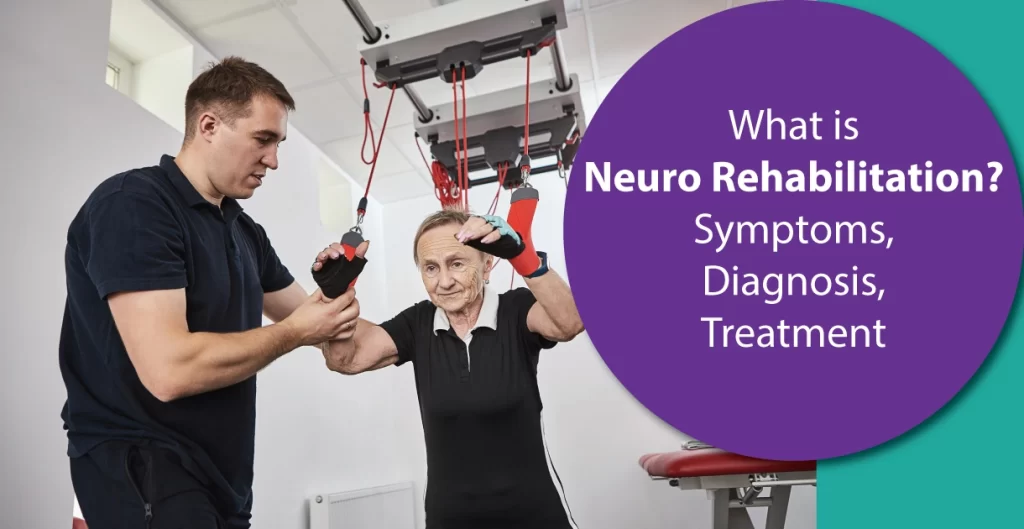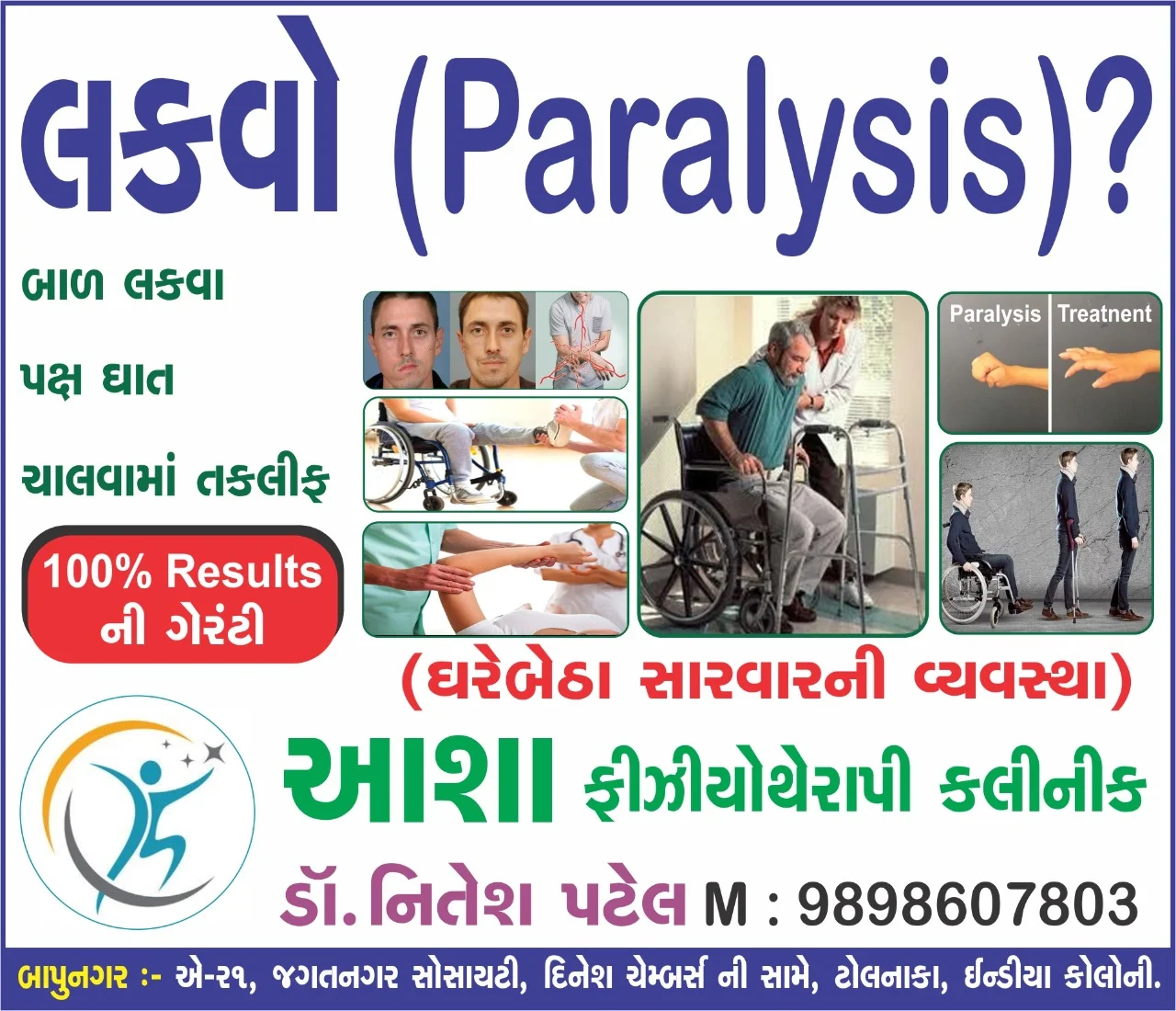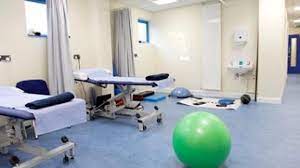Best Physiotherapy clinic for Neuro. in Ahmedabad
Samarpan Physiotherapy Clinic, in Ahmedabad Gujarat
Samarpan Physiotherapy Clinic is a leading neuro physiotherapy clinic located in Ahmedabad, Gujarat. With a commitment to providing exceptional care and personalized treatment, the clinic has established itself as a trusted destination for individuals seeking neurorehabilitation.
Samarpan Physiotherapy Clinic Address:
Samarpan Physiotherapy clinic Amaraiwadi branch
Bansidhar Society
Behind Bansidhar Medical,
Vastral Road,
Rabari Colony Cross Road,
near Metro Pillar No 77-78,
Opposite revabhai shopping center
Amraiwadi, Ahmedabad, Gujarat 380026
Dr. Nitesh Patel – Physiotherapist. Mo no: 09898607803
Dr. Komal Chauhan – Physiotherapist
Dr. Mohit Vaghela – Physiotherapist
Dr. Rahul Rathod – Physiotherapist
Dr. Namrata Prajapati – Physiotherapist
Contact no: 06352845017
website: https://samarpanphysioclinic.com/
Timing of the clinic:
Monday: Morning: 8:00 am to 1:00 pm, Evening: 3:00 pm to 8:00 pm.
Tuesday: Morning: 8:00 am to 1:00 pm, Evening: 3:00 pm to 8:00 pm.
Wednesday: Morning: 8:00 am to 1:00 pm, Evening: 3:00 pm to 8:00 pm.
Thursday: Morning: 8:00 am to 1:00 pm, Evening: 3:00 pm to 8:00 pm.
Friday: Morning: 8:00 am to 1:00 pm, Evening: 3:00 pm to 8:00 pm.
Saturday : Morning: 8:00 am to 1:00 pm, Evening: 3:00 pm to 8:00 pm.
Sunday: Morning: 8:00 am to 12:00 pm
Samarpan Physiotherapy Clinic Nava Naroda Branch
5, Govardhan Galaxy Bungalow
Near. Fortune Circle
Nikol Nava Naroda Road,
New India Colony road
Behind. Shalby Hospital
Nava Naroda, Ahmedabad.
Physiotherapists in the Clinic
Dr. Nitesh Patel – Physiotherapist.
Dr. Aarti– Physiotherapist
Dr. Bhumika – Physiotherapist
Dr. Avni Serasiya – Physiotherapist.
Time :
Morning: 8: 30 am to 1:00 pm
Evening: 4:00 pm to 8:00 pm
Samarpan Physiotherapy Clinic Bapunagar Branch
Chandragupt flat, Near Ramaji mandir
Near. Satsangi school,
India colony road
Behind Nilkanth dairy
Bapunagar, Ahmedabad
Physiotherapist in the clinic:
Dr. Nitesh Patel- Physiotherapist
Dr. Vaishali Ladva- Physiotherapist
Dr. Dharti Vaghasiya- Physiotherapist
Dr. Aarti Solanki- Physiotherapist
Time :
Morning: 8: 30 am to 1:00 pm
Evening: 4:00 pm to 8:00 pm
Samarpan Physiotherapy Clinic Vastral Branch
B-04, Shivalik Bungalow, Near. Metro pillar no. 156
Near. Ratanpura gam, Madhav school road
Near. Vedant play school
Vastral, Ahmedabad
Physiotherapist in the clinic:
Dr. Nitesh Patel- Physiotherapist
Dr. Falguni Luhar- Physiotherapist
Dr. Srusti Vaghasiya- Physiotherapist
Dr. Akshita Mehta- Physiotherapist
Clinic Time :
Morning: 8: 30 am to 1:00 pm
Evening: 4:00 pm to 8:00 pm
Mobile Physiotherapy Clinic Bapunagar
B-1, Jagatnagar Society, Opp.Shaktidhara Society
India Colony Road, Tollnaka, Bapunagar, Ahmedabad.
Dr. Nitesh Patel – Physiotherapist.
Dr. Vaishali Ladva – Physiotherapist
Dr. Pal Rawal – Physiotherapist
Dr. Priti Tiragar – Physiotherapist
Clinic time:
Morning: 8: 30 am to 1:00 pm
Evening: 4:00 pm to 8:00 pm
Asha Physiotherapy Clinic and Neuro Rehab Center
(On Panel ISRO)
Clinic Address:
A-21 Jagat Nagar Part-1,
Opp Shaktidhara Society
India Colony, opp. Dinesh Chambers,
Tolnaka, Bapunagar, Gujarat 380024
Contact No – Phone: 094283 62682
Clinic Timing:
Monday 8:30am–1:00pm, 4:00–8:00pm
Tuesday 8:30am–1:00pm, 4:00–8:00pm
Wednesday 8:30am–1:00pm, 4:00–8:00pm
Thursday 8:30am–1:00pm, 4:00–8:00pm
Friday 8:30am–1:00pm, 4:00–8:00pm
Saturday 8:30am–1:00pm, 4:00–8:00pm
Sundar: 9:00am to 12:pm
Dr. Nitesh Patel (B.P.T, MIAP)
At the helm of Samarpan Physiotherapy Clinic is Dr. Nitesh Patel, a highly skilled and experienced physiotherapist. Dr. Patel holds a Bachelor’s degree in Physiotherapy (B.P.T) and is a member of the Indian Association of Physiotherapists (MIAP). With his vast knowledge and expertise in the field, he is dedicated to helping patients recover from neurological conditions and improve their quality of life.
The clinic is equipped with state-of-the-art facilities and utilizes the latest techniques and technologies to deliver effective treatment. Dr. Patel and his team of trained professionals provide comprehensive neuro physiotherapy services, catering to patients with a wide range of neurological disorders, including stroke, spinal cord injuries, multiple sclerosis, Parkinson’s disease, cerebral palsy, and more.
The treatment approach at Samarpan Physiotherapy Clinic is tailored to meet the individual needs of each patient. Dr. Patel conducts thorough assessments and develops customized treatment plans, focusing on maximizing functional abilities and promoting independence. The clinic offers a variety of modalities, exercises, manual therapy techniques, and specialized equipment to optimize rehabilitation outcomes.
In addition to providing hands-on treatment, Dr. Patel also emphasizes patient education and empowerment. He educates patients and their families about their condition, helping them understand the importance of self-care and home exercises. This holistic approach ensures that patients receive continuous support and guidance throughout their recovery journey.
Samarpan Physiotherapy Clinic prioritizes patient comfort and convenience. The clinic maintains a warm and welcoming environment, fostering a sense of trust and relaxation. The staff members are compassionate, friendly, and dedicated to ensuring that patients feel comfortable and cared for during their visits.
If you or your loved one is in need of neuro physiotherapy services in Ahmedabad, Samarpan Physiotherapy Clinic is an excellent choice. Under the expert guidance of Dr. Nitesh Patel, you can expect top-quality care, personalized treatment plans, and a commitment to helping you regain your functional independence and enhance your overall well-being.
Physiotherapy Treatment in Neurological Conditions
Physiotherapy plays a crucial role in the rehabilitation of individuals with neurological conditions. It aims to optimize physical function, improve mobility, alleviate pain, and enhance overall quality of life. Here are some common physiotherapy treatments used in neurological conditions:
Assessment and Individualized Treatment Plans: A thorough assessment is conducted by the physiotherapist to evaluate the patient’s specific needs and functional limitations. Based on the assessment, an individualized treatment plan is developed to address the patient’s goals and promote recovery.
Mobility and Gait Training: Neurological conditions can often cause difficulties with walking and balance. Physiotherapists use various techniques, exercises, and assistive devices to improve mobility and gait patterns. This may include weight-bearing exercises, balance training, and walking practice with or without assistive devices like canes or walkers.
Strengthening Exercises: Muscle weakness is a common issue in neurological conditions. Physiotherapists design exercises to target specific muscle groups and improve strength. These exercises can be tailored to the individual’s abilities and may involve resistance training, isometric exercises, or functional movements.
Range of Motion Exercises: Neurological conditions can lead to stiffness and limited joint mobility. Physiotherapists employ range of motion exercises to maintain or improve joint flexibility. These exercises may include stretching, passive movements, and active-assisted movements.
Balance and Coordination Training: Impaired balance and coordination are significant challenges for individuals with neurological conditions. Physiotherapists utilize exercises and techniques to enhance balance, coordination, and postural control. This may involve balance boards, stability exercises, and coordination drills.
Functional Training: Physiotherapists focus on improving the patient’s ability to perform daily activities and tasks. They simulate real-life situations and provide training to enhance functional abilities such as getting up from a chair, climbing stairs, or reaching for objects. This helps individuals regain independence in their daily lives.
Pain Management: Neurological conditions often result in chronic pain. Physiotherapists employ various modalities such as heat or cold therapy, transcutaneous electrical nerve stimulation (TENS), or manual therapy techniques to alleviate pain and improve comfort.
Neurodevelopmental Techniques: These techniques are specifically designed for individuals with conditions like cerebral palsy or developmental delay. They aim to promote motor skills and coordination through repetitive movements and facilitated patterns of motion.
Assistive Device Assessment and Training: Physiotherapists assess the need for assistive devices such as wheelchairs, orthoses, or walking aids. They provide guidance on selecting appropriate devices and train individuals in their use to enhance mobility and independence.
Education and Home Exercise Programs: Physiotherapists educate patients and their families about the condition, treatment plan, and self-management strategies. They provide customized home exercise programs to promote continuity of care and encourage patients to take an active role in their recovery.
It’s important to note that physiotherapy treatment plans vary based on the specific neurological condition, its severity, and the individual’s unique needs. A physiotherapist with expertise in neurorehabilitation will tailor the treatment approach accordingly to ensure optimal outcomes.
Home Visit Treatment Facility for Paralyzed Patients
Home visit treatment facilities for paralyzed patients are an essential service provided by physiotherapists to ensure that individuals with paralysis receive necessary rehabilitation and care in the comfort of their own homes. Here’s an overview of the benefits and services offered by home-visit treatment facilities:
Convenience and Comfort: Home visit treatment eliminates the need for paralyzed patients to travel to a clinic or hospital, which can be challenging and time-consuming. By receiving treatment at home, patients can remain in familiar surroundings, reducing stress and promoting a sense of comfort.
Individualized Care: Home visits allow physiotherapists to provide personalized and focused care tailored to the specific needs of each paralyzed patient. The treatment plan is designed based on the patient’s condition, goals, and home environment, ensuring the highest level of individual attention.
Rehabilitation and Mobility Enhancement: Physiotherapists work with paralyzed patients to improve their mobility, independence, and overall quality of life. They utilize specialized exercises, techniques, and assistive devices to enhance muscle strength, range of motion, balance, and coordination. By focusing on functional activities, such as transfers, walking, and self-care tasks, physiotherapists promote maximum independence and functional abilities.
Pain Management: Paralyzed patients often experience pain due to muscle spasms, nerve damage, or immobility. Physiotherapists assess and address pain management through techniques such as manual therapy, stretching exercises, modalities like heat or cold therapy, and relaxation techniques. Pain management strategies are tailored to the individual’s specific needs and preferences.
Home Safety Assessment: Physiotherapists conduct home safety assessments to identify potential hazards and suggest modifications to promote a safe and accessible living environment for paralyzed patients. This may include recommending adaptations such as handrails, ramps, and proper positioning of furniture to minimize fall risks and facilitate independent mobility.
Education and Training: Physiotherapists educate paralyzed patients and their caregivers about the condition, management strategies, and proper techniques for transfers, positioning, and exercise. They provide guidance on maintaining skin integrity, preventing complications like pressure sores, and promoting overall well-being.
Emotional Support: Living with paralysis can have a significant emotional impact on patients and their families. Physiotherapists offer emotional support, encouragement, and motivation throughout the rehabilitation process. They act as a resource for addressing concerns, answering questions, and providing reassurance.
Collaborative Approach: Home visit treatment facilities often collaborate with other healthcare professionals involved in the care of paralyzed patients, such as occupational therapists, speech therapists, and medical doctors. This interdisciplinary approach ensures comprehensive and holistic care.
It’s important to consult with a physiotherapy clinic or a specialized home visit treatment facility that offers services for paralyzed patients. They will have experienced physiotherapists who can assess the patient’s needs and develop a personalized treatment plan to optimize their functional abilities and overall well-being in the home setting.
Range of Motion Exercises: Neurological conditions can lead to stiffness and limited joint mobility. Physiotherapists employ range of motion exercises to maintain or improve joint flexibility. These exercises may include stretching, passive movements, and active-assisted movements.
Balance and Coordination Training: Impaired balance and coordination are significant challenges for individuals with neurological conditions. Physiotherapists utilize exercises and techniques to enhance balance, coordination, and postural control. This may involve balance boards, stability exercises, and coordination drills.
Functional Training: Physiotherapists focus on improving the patient’s ability to perform daily activities and tasks. They simulate real-life situations and provide training to enhance functional abilities such as getting up from a chair, climbing stairs, or reaching for objects. This helps individuals regain independence in their daily lives.
How to find the Best Physiotherapist for Neuro. Rehabilitation?
Finding the best physiotherapist for neurorehabilitation requires careful consideration and research. Here are some steps to help you find a highly qualified and suitable physiotherapist for neurorehabilitation.
Seek Referrals: Start by asking for recommendations from your primary care physician, neurologist, or other healthcare professionals who specialize in neurology. They can provide insights and refer you to reputable physiotherapists who specialize in neurorehabilitation.
Research Credentials and Specializations: Look for physiotherapists who have specialized training and experience in neurorehabilitation. Check their credentials, such as their education, certifications, and memberships in relevant professional associations. The physiotherapist should have the necessary qualifications and expertise to treat neurological conditions.
Read Reviews and Testimonials: Read online reviews and testimonials from patients who have received neurorehabilitation treatment from the physiotherapist you are considering. Positive reviews and feedback can indicate the therapist’s competency and the quality of care provided.
Experience in Neurorehabilitation: Consider the physiotherapist’s experience in treating neurological conditions. Find out how long they have been practicing in the field of neurorehabilitation and their track record of success with patients.
Assess Communication and Empathy: Effective communication and a compassionate approach are important qualities in a physiotherapist. Neurorehabilitation can be a challenging and emotional journey, so finding a therapist who listens to your concerns, communicates clearly, and shows empathy is crucial for a positive therapeutic relationship.
Availability and Accessibility: Consider the location and availability of the physiotherapist. Choose someone who is easily accessible and offers convenient appointment times. Accessibility is especially important for individuals with mobility challenges or transportation limitations.
Consultation and Initial Assessment: Schedule a consultation or initial assessment with the physiotherapist you are considering. This will give you an opportunity to discuss your specific condition, treatment goals, and assess their approach to neurorehabilitation. Ask questions about their treatment methods, success rates, and their plan for your rehabilitation.
Collaboration with a Multidisciplinary Team: Neurorehabilitation often requires collaboration with other healthcare professionals, such as occupational therapists, speech therapists, and neurologists. Consider a physiotherapist who has experience working as part of a multidisciplinary team to provide comprehensive care.
Insurance Coverage: If you have health insurance, check if the physiotherapist accepts your insurance plan. Understanding the coverage and associated costs will help you make an informed decision.
Trust Your Instincts: Trust your instincts and choose a physiotherapist with whom you feel comfortable and confident. A strong rapport and a sense of trust between you and your physiotherapist can contribute to a more effective rehabilitation process.
By following these steps and conducting thorough research, you can find the best physiotherapist for neurorehabilitation who can provide expert care and support on your path to recovery.
What is a Neuro. Physiotherapist?

A neuro physiotherapist, also known as a neurological physiotherapist, is a specialized physiotherapist who focuses on the assessment, treatment, and rehabilitation of individuals with neurological conditions affecting the central nervous system, peripheral nervous system, and/or neuromuscular system. Neuro physiotherapists have advanced training and expertise in working with patients who have conditions such as stroke, spinal cord injury, traumatic brain injury, multiple sclerosis, Parkinson’s disease, cerebral palsy, and other neurological disorders.
The role of a neuro physiotherapist involves understanding the unique challenges and impairments that arise from neurological conditions. They work closely with patients to help them regain or maximize their physical function, mobility, and overall quality of life. Here are some key aspects of a neuro physiotherapist’s role:
Assessment: Neuro physiotherapists perform thorough assessments to evaluate the individual’s neurological status, functional abilities, movement patterns, strength, coordination, balance, and other relevant factors. These assessments help in identifying specific impairments and designing individualized treatment plans.
Treatment Planning: Based on the assessment findings, neuro physiotherapists develop tailored treatment plans to address the patient’s specific needs and goals. These plans often incorporate various therapeutic techniques, exercises, and interventions aimed at improving mobility, strength, balance, coordination, and functional abilities.
Rehabilitation Techniques: Neuro physiotherapists utilize a wide range of techniques and interventions to facilitate neurorehabilitation. These may include therapeutic exercises, functional training, gait and balance training, electrical stimulation, manual therapy, hydrotherapy, virtual reality, and other specialized modalities.
Neuroplasticity and Motor Learning: Neuro physiotherapists understand the principles of neuroplasticity and motor learning, which emphasize the brain’s ability to reorganize and adapt. They employ specific techniques and activities that encourage the rewiring and retraining of the nervous system to optimize recovery and functional improvements.
Assistive Devices and Technology: Neuro physiotherapists are knowledgeable about various assistive devices and technologies that can aid in mobility and rehabilitation. They assess the need for assistive devices like orthoses, wheelchairs, walking aids, or adaptive equipment, and provide guidance on their selection and proper usage.
Patient Education and Self-Management: Neuro physiotherapists play a vital role in educating patients and their families about the condition, treatment strategies, and self-management techniques. They provide guidance on home exercises, positioning, energy conservation, and strategies to promote independence and safety.
Multidisciplinary Collaboration: Neuro physiotherapists often collaborate with other healthcare professionals, such as occupational therapists, speech therapists, neurologists, and rehabilitation specialists, to provide comprehensive care and achieve the best outcomes for their patients.
Emotional Support: Neurological conditions can have significant emotional and psychological impacts. Neuro physiotherapists provide emotional support, motivation, and encouragement to patients throughout the rehabilitation process, helping them cope with challenges and maintain a positive mindset.
By utilizing their specialized knowledge and skills, neuro physiotherapists play a crucial role in facilitating neurorehabilitation and helping individuals with neurological conditions improve their physical function, regain independence, and enhance their overall well-being.


